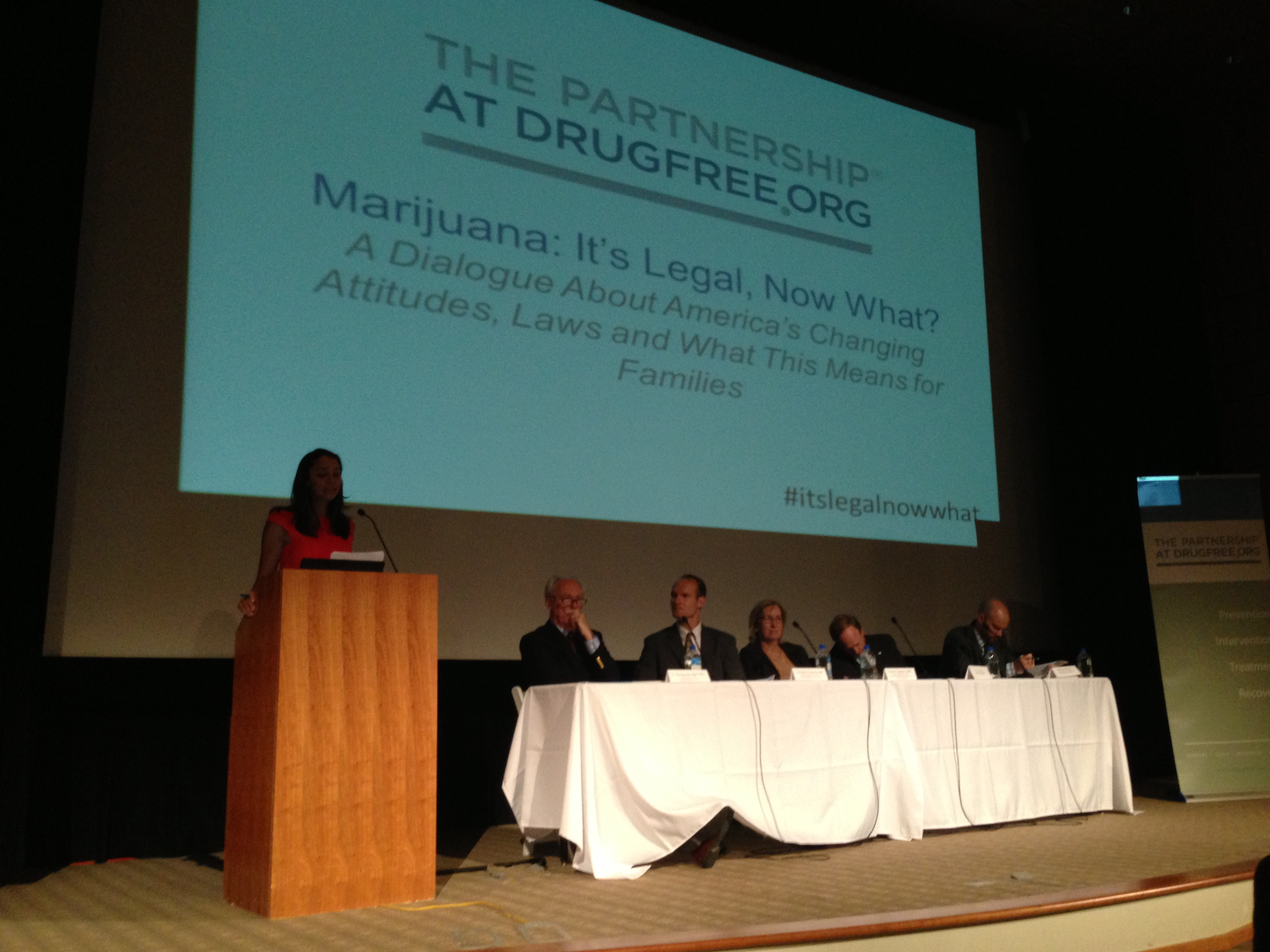Even parents who support marijuana legalization expect strong regulation of the drug that includes bans on public use and advertising of any kind, according to the results of a national survey released today in Denver by The Partnership at Drugfree.org.
The survey of 1,603 adults included 1,200 parents of children ages 10-19. Of those parents, 200 live in Colorado, and 200 live in Washington state, where marijuana was legalized for recreational use in 2012. Roughly half of all parents surveyed reported having used marijuana. The number was higher for parents living in Colorado — 62 percent.
- Dr. Christian Thurstone
- A. Thomas, McClellan, Ph.D., an expert researcher on addiction treatment who served as science advisor and deputy director of the White House Office of National Drug Control Policy. Mr. McLellan is now chief executive officer of the Treatment Research Institute, which works to change the ways research is used to treat addiction and develop public policies around substance use and abuse.
- Cheryl G. Healton, Dr.P.H., president and chief executive officer of Legacy, a foundation with this bold mission: to build a world where young people reject tobacco and anyone can quit. She also serves as dean of global public health and director of the Global Institute of Public Health at New York University.
- Colorado Attorney General John Suthers, a strong and vocal opponent of Colorado’s Amendment 64. Mr. Suthers says he now works to uphold the Colorado law he called “terrible public policy.”
- Brian Vicente, co-founder of Vicente Sederberg, a law firm that bills itself as “providing legal solutions for the medical marijuana community. Mr. Vicente, along with his partner, Christian Sederberg, co-authored Colorado’s Amendment 64.
The survey showed strong support in the general adult population for the medicalization (70 percent), decriminalization (50 percent) and legalization (40 percent) of marijuana. However, it also showed that adults’ beliefs about the drug and its impacts on health are “dreadfully wrong,” and their understanding of regulating the drug as they expect it to be “horribly naive,” Mr. McLellan said.
Indeed, the survey showed overwhelming support for strong marijuana regulation — even in Colorado and Washington. Among the survey’s findings:
- 90 percent of parents believe marijuana should be sold only through licensed growers and sellers and not in places like convenience stores, supermarkets or newsstands.
- Similarly high percentages of parents (90 percent of Colorado parents and 91 percent of Washington parents) said marijuana should be banned in public places where tobacco is now banned.
- A majority of parents — including 90 percent of parents in Colorado and 91 percent in Washington — agreed it should be illegal to provide marijuana to underage children at home.
- More than 80 percent of all parents — 87 percent of Colorado parents — said “marijuana advertising should still be banned.”
- When forced to choose, a majority of parents identified the No. 1 place where it should be permissible to advertise marijuana as “nowhere.”
“Cognitive dissonance. That’s what I see here,” Mr. Suthers said. “You can’t say you want legalized marijuana, and then you don’t want your kids exposed to it.”
He added later in the presentation:
“History (with alcohol and tobacco regulation) suggests we’re not going to be very successful at (banning the commercialization of a legal industry). Don’t count on any corporate responsibility. Don’t look for the online folks to cooperate.
“I’m glad we’re moving away from the hypocrisy of medical marijuana … I just don’t want anybody to fall into this notion that we are going to regulate this, and everything is going to be fine.”
Regulations will be especially ineffective if people remain uneducated about marijuana, the panel’s medical-research experts said. Indeed, survey respondents reported that marijuana use was less dangerous than prescription drug abuse, smoking cigarettes and drinking alcohol. The survey also showed they were less concerned about marijuana’s effects on the heart, the drug’s drastically increased potency, its carcinogenic content and repeated findings that marijuana use increases a person’s chances of trying other addictive drugs.
“If parents want the responsibility of educating their children about this drug — which is great — they’re going to have to bone up and learn a lot more about it,” Mr. McLellan said after the presentation. “It’s always better to admit you don’t know something than to feel you know something that is totally incorrect.”
The Partnership at Drugfree.org, which works to prevent and address problems of teen substance abuse, teamed with Batten & Co., a subsidiary of advertising agency BBDO Worldwide, to enlist Whitman Insight Strategies to conduct the survey.
After today’s presentation, I caught up with Mr. McLellan for more of his insights — and advice for Coloradans and anyone pushing for responsible policies regarding marijuana:



We welcome all thoughtful comments, but please abide by our commenting rules